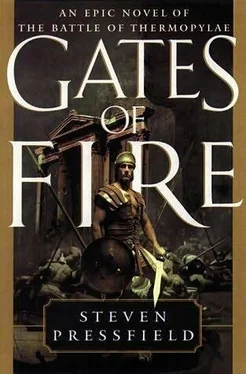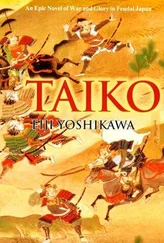Steven Pressfield - Gates of Fire - An Epic Novel of the Battle of Thermopylae
Здесь есть возможность читать онлайн «Steven Pressfield - Gates of Fire - An Epic Novel of the Battle of Thermopylae» весь текст электронной книги совершенно бесплатно (целиком полную версию без сокращений). В некоторых случаях можно слушать аудио, скачать через торрент в формате fb2 и присутствует краткое содержание. Жанр: Историческая проза, на английском языке. Описание произведения, (предисловие) а так же отзывы посетителей доступны на портале библиотеки ЛибКат.
- Название:Gates of Fire: An Epic Novel of the Battle of Thermopylae
- Автор:
- Жанр:
- Год:неизвестен
- ISBN:нет данных
- Рейтинг книги:3 / 5. Голосов: 1
-
Избранное:Добавить в избранное
- Отзывы:
-
Ваша оценка:
- 60
- 1
- 2
- 3
- 4
- 5
Gates of Fire: An Epic Novel of the Battle of Thermopylae: краткое содержание, описание и аннотация
Предлагаем к чтению аннотацию, описание, краткое содержание или предисловие (зависит от того, что написал сам автор книги «Gates of Fire: An Epic Novel of the Battle of Thermopylae»). Если вы не нашли необходимую информацию о книге — напишите в комментариях, мы постараемся отыскать её.
Gates of Fire: An Epic Novel of the Battle of Thermopylae — читать онлайн бесплатно полную книгу (весь текст) целиком
Ниже представлен текст книги, разбитый по страницам. Система сохранения места последней прочитанной страницы, позволяет с удобством читать онлайн бесплатно книгу «Gates of Fire: An Epic Novel of the Battle of Thermopylae», без необходимости каждый раз заново искать на чём Вы остановились. Поставьте закладку, и сможете в любой момент перейти на страницу, на которой закончили чтение.
Интервал:
Закладка:
His Majesty had now crossed to the spot where the axehead was embedded and with His dagger cut through the enwrapping cord to expose the weapon. Upon the steel of the axehead, His Majesty identified the double-headed griffin of Ephesus, whose corps of armorers' privilege it was to provide all edged blades and lances for Mardonius and his commanders.
Tell me now, His Majesty addressed the general, that no god's hand is at work here.
His Majesty declared that He and His counselors had already from the captive's tale gleaned much that was as instructive as it was unanticipated. How much more of value may we yet learn?
With a gesture of warmth, His Majesty motioned the man Xeones closer to Him and had the fellow's still gravely ill form propped upon a settle.
Please, my friend, continue your tale. Tell it as you wish, in whatever manner the god instructs you.
Chapter Twenty
I had watched the army marshal on the plain beneath Athena of the Brazen House perhaps fifty times over the previous nine years, in various strengths of call-up as it prepared to march out to one campaign or another. This one, the corps dispatched to the Hot Gates, was the slenderest ever. Not a two-thirds call-up as before Oenophyta, when nearly six thousand warriors, squires and their battle train had filled the plain, nor a half-mobilization, forty-five hundred, as before Achilleion, nor even a two-mora, twenty-five hundred, when Leonidas led the force to Antirhion which Alexandras and I had followed as boys.
Three hundred.
The meager tally seemed to rattle about the plain like peas in a jar. Just three dozen pack animals stood in the fore along the roadway. There were only eight waggons; the sacrificial herd was marshaled by two scared-looking goat boys. Supply trains had already been dispatched and dumps set up along the six-day route. In addition, it was anticipated, the allied cities would provide provisions along the way, as the Spartan forerunners picked up the various contingents which would complete the force and bring it to its full complement of four thousand.
An august silence pervaded the valedictory sacrifices performed by Leonidas in his role as chief priest, assisted by Olympieus and Megistias, the Theban seer who had come to Lakedaemon of his own volition, with his son, out of love not of his native city alone, but of all Hellas, to contribute without fee or reward his art in divination.
The entire army, all twelve lochoi, had been drawn up, not under arms because of the Karneian prohibition but yet in their scarlet cloaks, to witness the march-out. Each warrior of the Three Hundred stood garlanded, xiphos-armed with shield at the carry, scarlet cloak draped across his shoulders, while his squire stood at his side holding the spear until the sacrifices were completed.
It was the month, as I said, of Karneius, the new year having begun at midsummer as it does in the Greek calendar, and each man was due to receive his new cloak for the year, replacing the now-threadbare one he had worn for the previous four seasons. Leonidas ordered the issue discontinued for the Three Hundred. It would be an improvident use of the city's resources, he declared, to provide new garments for men who would have use of them for so brief a time.
As Medon had predicted, Dienekes was chosen as one of the Three Hundred. Medon himself was selected. At fifty-six he was the fourth oldest, behind only Leonidas himself, who was past sixty, Olympieus and Megistias the seer. Dienekes would command the enomotia from the Herakles regiment. The brothers and champions of Olympia, Alpheus and Maron, were likewise selected; they would join the platoon representing the Oleaster, the Wild Olive, whose position would be to the right of the Knights, in the center of the line. Fighting as a dyas, the paired pentathlete and wrestler towered invincible; their inclusion greatly heartened one and all. Aristodemos the envoy was also selected. But most startling and controversial was the election of Alexandros.
At twenty he would be the youngest line warrior and one of only a dozen, including his agogemate Ariston (of Polynikes' broken noses), without experience of battle. There is a proverb in Lakedaemon, the reed beside the staff, whose meaning is that a chain is made stronger by its possession of one unproven link. The tender hamstring that drives the wrestler to compensate with skill and cunning, the lisp that the orator extends his brilliance to overcome. The Three Hundred, Leonidas felt, would fight best not as a company of individual champions, but as a sort of army in miniature, of young and old, green and seasoned. Alexandros would join the platoon of the Herakles commanded by Dienekes; he and his mentor would fight as a dyas.
Alexandros and Olympieus were the only father and son selected for the Three Hundred.
Alexandras' infant boy, also named Olympieus, would be their survivor and maintain the line. It was a sight of extreme poignancy, there along the Aphetaid, the Going-Away Street, to watch Alexandras' bride, Agathe, only nineteen years old, hold up this babe for the final farewell.
Alexandros' mother, Paraleia, she who had interrogated me so masterfully after Antirhion, stood beside the girl beneath the same myrtle grove from which Alexandros and I had departed that night years ago to follow the army.
Good-byes were said on the march as the formation trooped solemnly past the rubble-walled assembly platform called the Forts, beneath the hero shrines of Lelex and Amphiareus, to the road's turn at the Running Course, above which the boys' platoons clustered at Axiopoinos, the Temple of Athena of Just Requital, Athena Tit for Tat. I watched Polynikes bid his three lads farewell; the eldest at eleven and nine stood already in the agoge. They straightened within their black cloaks with the gravest dignity; each would have cut off his right arm for the chance to march now with his father.
Dienekes paused before Arete on the roadside adjacent the Hellenion, whose porches stood bedecked in laurel with ribands of yellow and blue for the Karneia; she held out Rooster's boy, now named Idotychides. My master took each of his daughters in turn into his arms, lifting the younger two and kissing them with tenderness. Arete he embraced one time, setting his cheek against her neck, to smell the scent of her hair for the last time.
Two days previous to this gentle moment, the lady had summoned me in private, as she always did before a march-out. It is the Spartans' custom during the week preceding a departure for war for the Peers to pass a day neither in training nor drill, but at their ease upon the kleroi, the farmsteads each warrior holds under the laws of Lykurgus and from which he draws the produce which supports himself and his family as a citizen and a Peer. These county days, as they are called, comprise a homely tradition deriving, reason must surmise, from the warrior's natural wish to revisit prior to battle, and in a sense bid farewell to, the happy scenes of his childhood.
That and the more practical purpose, in the ancient days at least, of outfitting and provisioning himself from the kleros's stores. A county day is a fair, one of the rare occasions when a Peer and those who serve his land may congregate as fellows and stuff their bellies with a carefree heart.
In any event this was where we headed, to the farmstead called Daphneion, several mornings before the march-out to the Gates.
Two families of Messenian helots worked this land, twenty-three in all, including a pair of grandmothers, twins, so ancient they could not recall which of them was which, plus the only slightly less dotty stump-leg Karnerion, who had lost his tight foot in service as Dienekes' father's squire. This toothless gaffer could outswear the foulest-tongued sailor and presided at his own insistence, and to the delight of all, as master of ceremonies for the day.
Читать дальшеИнтервал:
Закладка:
Похожие книги на «Gates of Fire: An Epic Novel of the Battle of Thermopylae»
Представляем Вашему вниманию похожие книги на «Gates of Fire: An Epic Novel of the Battle of Thermopylae» списком для выбора. Мы отобрали схожую по названию и смыслу литературу в надежде предоставить читателям больше вариантов отыскать новые, интересные, ещё непрочитанные произведения.
Обсуждение, отзывы о книге «Gates of Fire: An Epic Novel of the Battle of Thermopylae» и просто собственные мнения читателей. Оставьте ваши комментарии, напишите, что Вы думаете о произведении, его смысле или главных героях. Укажите что конкретно понравилось, а что нет, и почему Вы так считаете.












